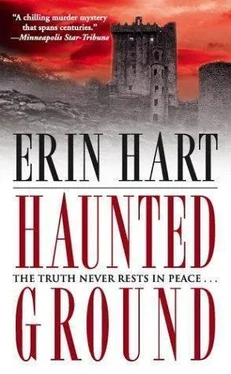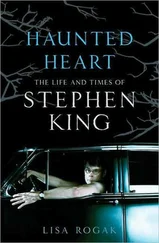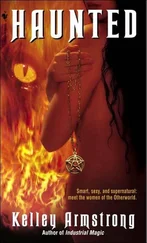A droplet of sweat trickled down and stung Nora’s eye, interrupting her train of thought. Why the hell was it that every time she tried to concentrate on the red-haired girl, she always came around again to Triona—and to the missing woman in the photograph? And why was she so anxious to see Hugh Osborne guilty of murder? She knew next to nothing about the case, only what Devaney had told them, and she wasn’t likely to learn any more. She couldn’t let another piece of unfinished business chase after her the rest of her life. She pushed the buttons to gradually slow her pace. The dusk was gone, replaced by darkness, and she could see herself reflected in the window. Leave this, said the voice in her head. She watched the outline of her shoulders rise and fall with each breath. Let it go. She stepped from the machine, feeling as she always did after a long workout: buoyant, as if she walked on air. An answer to the internal voice floated up inside her: I’ll try. I can’t promise, but I will try.
Devaney sat in the car parked just outside the gate of Bracklyn House. This couldn’t really be considered proper surveillance, but it was the best he could do. He’d managed to persuade Nuala to lend him her car, provided he got it back in time for her to meet some clients for a drink. She’d picked out this car on her own, paid for it herself as a point of pride.
He’d never used the car phone, and was fiddling idly with the buttons when a dusty black Volvo wagon came out of the gate. It was Osborne. Devaney waited a few seconds, then pulled out behind the Volvo. He could keep his distance around Dunbeg, aided by the fact that there were not many roads in this part of the countryside. Osborne seemed to be heading north, toward Loughrea. Devaney checked his watch. Seven o’clock. He’d break off when he had to in order to get home by half-nine.
At Loughrea, Osborne turned onto the N6 heading west. There’d be more traffic on this road, less chance of being spotted. He eased onto the highway after the black Volvo, leaving a couple of cars between them. Osborne continued into Galway, following the signposts for the city center. Devaney nearly lost him on the first roundabout, but caught sight of the car and made the turn at the last minute. He checked his watch again. Nearly a quarter past eight. He should try to call Nuala, let her know that at this rate he might be a few minutes late. She could always take his car, a point he’d brought up when they’d made the switch. To pick up clients? she’d said. He’d gathered it was out of the question.
He lifted the car phone from its cradle, but slammed it down again when he had to turn a corner to keep the Volvo in sight. No use trying until he was stopped somewhere, if that ever happened, unless he wanted to crash the car in addition to being late. He followed as Osborne edged his way around Eyre Square, then pulled into a tiny side street near the docks.
Hugh Osborne parked his car, then entered an unmarked doorway on street level. Devaney would have to drive closer or approach on foot, but either way he’d run the risk of being spotted. He parked about thirty yards away, and waited. He peered up and down the street. No fucking chance of a phone box when you needed one, was there? He looked down at the mobile, and felt the sleek black case with its tiny red and green lights mocking him. How was it Nuala could just figure out all this technology, make it part of her life as she went sailing forth into the world, and leave him standing on the dock? He picked up the handset, held it to his ear. Silence. Maybe you had to press something to turn the bloody thing on. He pushed gingerly on a tiny button marked “Speak,” and a loud dial tone filled the car. He slammed the phone down, pushing buttons furiously to cut off the noise, which must have been audible all up and down the quiet street.
Just then, Osborne emerged from the doorway, looking shaken. He went to his own car and opened the door, but before getting in he seemed to have some sort of a spell, grasping the car door for support, and lowering his head, as if he were going to be sick. And he doesn’t even know anyone’s watching him here, Devaney thought, unless I’ve completely blown it. As he retraced the journey, trying to remember if there were any points at which Osborne might have caught a glimpse of him, the Volvo’s engine started, and it pulled abruptly away from the curb. Devaney put his car in gear and followed, hoping Osborne hadn’t gotten too much of a head start. When he rounded the corner, there was a lorry dead ahead, maneuvering its way into position to drop off a load of empty Guinness kegs. Devaney slammed on the brakes, narrowly missing the man who was directing the lorry, and came to a stop about eighteen inches from its rear end.
“Watch where ye’re going, ya dowsy bollocks,” shouted the man, pounding the nose of the car with his fist. “You could have fuckin’ killed me.” Devaney reversed out of the side street, and went back the way he’d come. Osborne was lost. There was no way to find him again. It was nearly half past eight. If he left now, he could head home and not be more than a quarter of an hour late. But what had happened when Osborne went into that building? He pulled up near the doorway to have a closer look. A thirtyish, sandy-haired man in a leather jacket stood at the door, evidently having trouble with the lock. He tried a second key, and was just trying the third when Devaney came up behind him.
“Closed for the evening, are you?” Devaney asked. The man looked up, startled. His face was narrow, slightly ruddy, and there was a shaving cut just below his right ear. The plaque beside the door read “Eddie Dolphin, Private Investigations.” Mustn’t have had the place for long, Devaney thought, if he’s still fishing for the key.
“Why don’t you open up again, Eddie, so we can have a bit of a chat?” The man’s startled look transformed to wariness, then took on an air of forced nonchalance, the mark of a bad actor. There was something else in the set of his jaw; he didn’t want to lose a job, if that’s what Devaney turned out to be.
“I was just headin’ home. Why don’t I give you me card, and you can ring me or come round in the morning—” His manner altered visibly once more, to nervous agitation, when Devaney produced his identification.
“Let’s do it now, if you don’t mind. While I’m in the neighborhood.”
Eddie Dolphin opened the door again, and led the way up the wooden steps. He might as well have been climbing to the gallows. When they entered the office, he slumped into his office chair, staring glumly at the cluttered desktop.
Devaney studied Dolphin’s demeanor, then looked about, gathering the facts of his surroundings. He took his time, partly to get a firm grasp of his bearings, and the better to prepare Mr. Dolphin for questioning. The building had the look of an old barracks: two stories, single windows at regular intervals. Dolphin’s tiny office had two windows, one facing the street, one overlooking warehouse loading areas to the rear, its grimy surface barely admitting a slanting shaft of light from a street lamp. The place smelled of dust and faintly of mildew. The coat of paint on the walls and window sashes was fresh, but carelessly applied. The closet in one corner had evidently been set up as a makeshift darkroom: a large bottle of developer stood inside the door, along with several brand-new computers still in cartons. The trash bin was overflowing with empty pint bottles of Guinness and take-away containers. Late nights, Devaney thought as he turned once more to Dolphin, who had begun picking nervously at one of the several piles of papers that seemed to have randomly accumulated on his desktop.
“Has Osborne been a client for long, Eddie?” Devaney asked, crossing his arms and leaning back casually against the door frame.
Читать дальше











